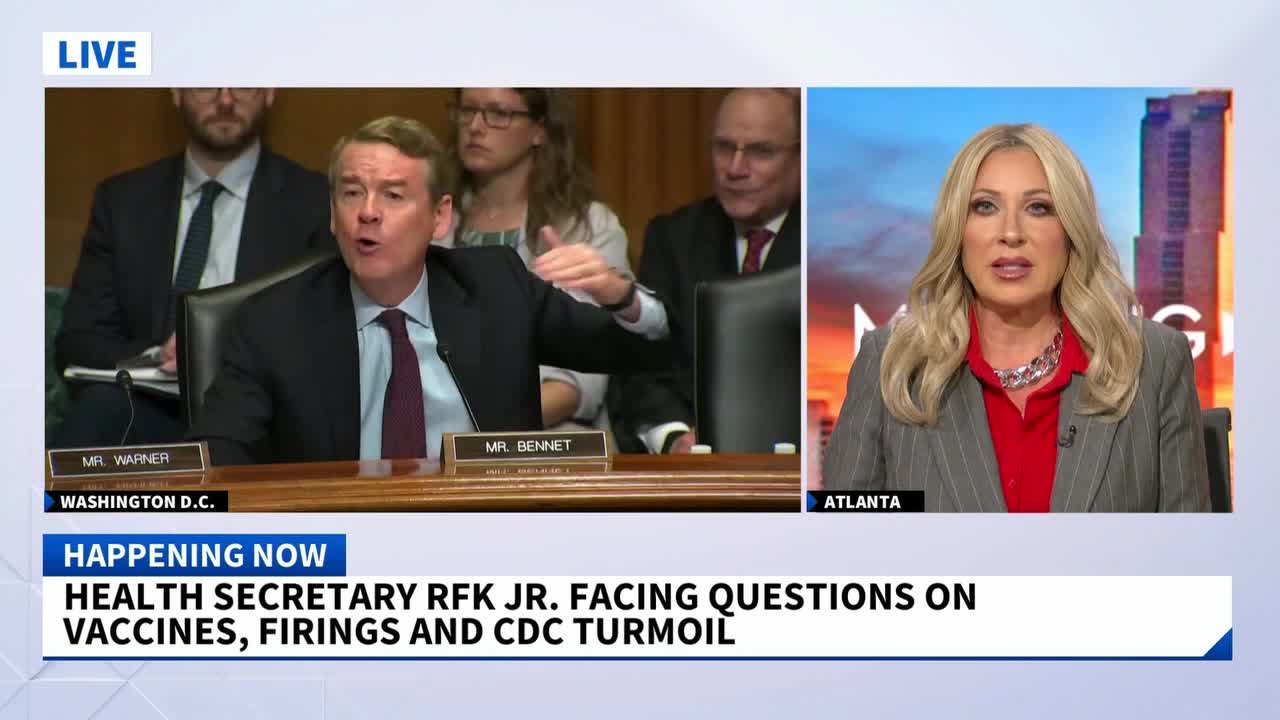Health and Human Services Secretary Robert K. Kennedy Jr appeared before the Senate Finance Committee on Thursday amid calls for his resignation and defended his stance on vaccines and his decisions to fire personnel in his department.
Kennedy has faced criticism, both from within HHS as well as the medical community, for the firing of Centers for Disease Control and Prevention Director Susan Monarez and for reducing access to COVID-19 vaccines.
He told lawmakers that he is “pro-medicine, not anti-vaccine.” Kennedy said he is restoring trust in the CDC, while opponents argued he’s sowing doubt in established vaccine schedules.
In an op-ed published Thursday morning in the Wall Street Journal, Monarez claimed that Kenned told her to "preapprove the recommendations of a vaccine advisory panel newly filled with people who have publicly expressed antivaccine rhetoric."
During his testimony on Thursday, Kennedy called Monarez a liar.
"I did not say that to her," Kennedy said.
Kennedy did admit to asking her to fire multiple career CDC officials. Earlier this year, Kennedy fired all 17 members of the previous committee. Kennedy's announced replacements were criticized for lacking expertise on vaccines and public health.
Following Kennedy's testimony, Monarez's lawyers issued the following statement: "Secretary Kennedy's claims are false, and at times, patently ridiculous. Dr. Monarez stands by what she said in her op-ed in The Wall Street Journal, would repeat it all under oath and continues to support the vision she outlined at her confirmation hearing that science will control her decisions."
Earlier this week, nine former heads of the CDC wrote an op-ed in the New York Times calling Kennedy's views on public health "dangerous." That was followed by a letter sent to members of Congress from over 1,000 employees of HHS calling for Kennedy's firing.
Thursday's hearing was focused on President Donald Trump's health care agenda. As a protester disrupted Thursday's hearing, Kennedy defended his actions.
"We have been the busiest, most proactive administration in HHS history," he said.
Kennedy pointed to new regulations involving artificial colors in food, fluoride in public drinking water, electronic cigarettes, and tianeptine. But some of his policies, such as fluoride in drinking water, have drawn criticism.
Many medical groups have objected to the CDC eliminating recommendations for adding fluoride to drinking water, saying the chemical is safe and effective at reducing cavities.
Future of vaccine recommendations in question
Sen. John Barrasso, a doctor and Republican from Wyoming, said he has heard from fellow medical professionals concerned that Kennedy's stance on vaccines was damaging public health.
"Over the last 50 years, vaccines are estimated to have saved 154 million lives worldwide. I support vaccines on the doctor. Vaccines work," he said.
Barrasso asked Kennedy about the future of vaccine guidance.
"We're going to make it clear, evidence-based and trustworthy for the first time in history," Kennedy said.
Kennedy claimed that children today are recommended to get between 69 and 92 vaccines by the time they turn 18. It appears, however, he is counting annual shots, such as influenza and COVID-19 vaccines.
"We're going to go back to observational studies on the existing vaccines to see if they're linked to any of these chronic disease epidemics so that people can understand the risk profile of those products and make good assessments for their own health," he said.
Key Republican critical of Kennedy
Sen. Bill Cassidy, a doctor whose vote confirming Kennedy was seen as pivotal, said Kennedy's policies made it more difficult for people to get COVID-19 vaccines this winter.
"I would say effectively, we're denying people vaccine," he said.
"You're wrong," Kennedy responded.
The CDC’s Advisory Committee on Immunization Practices has not yet met this year to consider reapproving distribution of updated COVID-19 vaccines ahead of the anticipated winter season. Some states do not allow pharmacists to administer the vaccine without approval.





